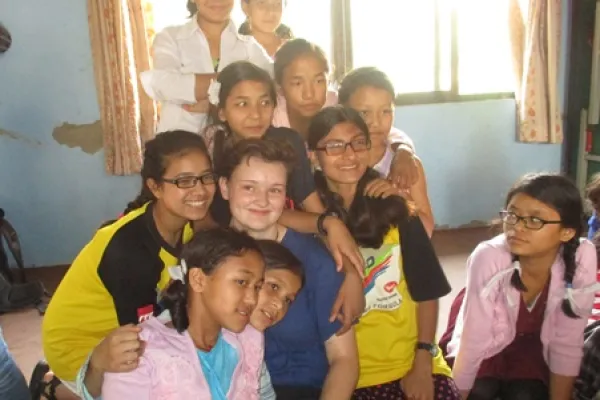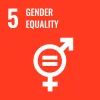Overview
Medical Internship in Nepal is an ideal platform for overseas students from pre-med, medical, and nursing backgrounds. Students joining this program will be placed at local hospitals, both private, government and medical clinics.
Interning in Nepal’s medical internship program offers an invaluable opportunity for aspiring healthcare professionals to enhance their knowledge and skill set. Under the guidance of experienced doctors and nursing staff, medical interns will gain insight into Nepal’s healthcare practices, observing a range of procedures and treatments. This exposure not only enriches their understanding of global medical systems but also provides a distinct advantage in their medical careers, setting them apart from peers back in college.
The internship is structured to pair medical students with local healthcare professionals, providing clinical exposure while offering the chance to observe and learn directly from practitioners in a dynamic environment. Designed for pre-med and medical students, this program offers an ideal platform to gain practical experience, refine clinical skills, and build a comprehensive understanding of patient care in a developing healthcare system.
Medical internships in Nepal allow participants to observe and assist professionals in fields such as:
Emergency Care
ICU
NICU
CCU
Blood Bank
Radiology - CT-Scan, Ultrasound, X-ray and Mammography
Endoscopy
Colonoscopy
ECG
Echocardiography
Immunization
Physiotherapy
Pathology
Nursing
ENT
General medicine
Gastrointestinal
Orthopedics
Cardiology
Pediatrics
Nursing
Interns may rotate across departments to gain a broad understanding of healthcare priorities. Supervision is provided by local healthcare teams, including doctors, nurses, and department leaders, who guide interns through their responsibilities and learning experiences.
Participating in this program boosts professional growth while contributing to a deeper appreciation of healthcare challenges and innovations in Nepal. For students seeking a transformative experience that enhances their medical career prospects, this internship delivers both academic and personal development opportunities.
Sample Placement Profile - Manmohan Memorial Medical College and Teaching Hospital
Manmohan Memorial Medical College and Teaching Hospital, located in Swoyambhu-15, Kathmandu, is a prominent healthcare institution offering a wide range of medical services and educational opportunities. With a capacity of 300 beds, the hospital provides comprehensive care across multiple specialties, supported by modern facilities and cutting-edge technology. Key services include Emergency Care, ICU, NICU, CCU, Blood Bank, CT-Scan, Ultrasound, X-ray, Mammography, Endoscopy, Colonoscopy, ECG, Echocardiography, Immunization, Physiotherapy, Pathology, and more. Additional offerings include Yoga sessions, family planning guidance, ENT care, and pharmacy services.
This hospital is a one of the placements for Volunteering Solutions’ Medical Internship Program in Nepal, where participants can gain experience and valuable insights into Nepal's healthcare system. Interning at Manmohan Memorial Medical College provides a unique opportunity to observe skilled medical professionals, assist in patient care, and contribute to the community's well-being. It is an ideal setting for pre-medical and medical students looking to enhance their practical skills and deepen their understanding of healthcare practices in a global context.
Intern Work Schedule
Intern Work Schedule
Volunteers joining the medical internship program in Nepal will be accommodated with a host family or at a volunteer house. Both the arrangements are located close to the placement facility and are provided with meals. A typical schedule while volunteering in Nepal goes like;
Sunday - Arrival in Kathmandu
Monday - Orientation session by the local coordinator covering topic areas; such as safety, culture, language, places to visit, behavior, food, and more. This will be followed by a visit to the placement facility in the company of the local coordinator to get introduced to the placement and the Inmates.
Tuesday to Friday - Volunteer work
Breakfast - 08:00 am onwards
Volunteer at placement - 09:00 am to 12:30 pm and 02:00 pm to 05:00 pm
Lunch - 01:00 pm (will be provided at the accommodation)
Dinner - 07:00 pm
Weekends - Free to explore the city (Lunch is not provided on Fri/Sat/Sunday)
The same volunteer work schedule continues from the second week onwards
Note: Please note, the schedule may vary depending on the particular project the volunteer is participating on.
Intern Roles & Responsibilities
Intern Roles & Responsibilities
The tasks assigned to the interns will be strictly on the basis of the level of their education and experience. While pre-med students would mostly be observing the doctors and the staff, 3rd and final year medical as well as nursing students can get some hands-on experience depending upon their level of work experience and understanding; such as suturing wounds, giving vaccinations, measuring blood pressure, fever, etc. A list of daily routine of the intern volunteers includes general tasks as given below:
- Depending on skills, assist with procedures like suturing wounds, giving vaccinations, etc.
- Shadow the Doctors on critical surgeries and operations
- Being involved in the daily procedures of the hospital
- Conducting hospital rounds with the doctors
- Maintaining files
- Routine patient check-ups like measure blood pressure and other vitals
Project Requirement
Project Requirement
Interns must be 18 years or older at the time of joining the internship. As an intern, you should have an open mind and flexible attitude for working in a new and different environment. Medical interns must provide a clean criminal background check report, CV, Passport Copy as well as other documents and credentials pertaining to their qualifications prior to joining the program. Pre Med, Medical, Nursing students and CNA’s can join the program. All students must adhere to professional attire while at the hospitals.
Schedule a Google Meet with a Program Advisor
Interested in our programs? We're here to provide expert guidance
- Get Detailed Info
- 20 min One -on-One meeting
- Get expert advise
- Application Guidance
Photo Gallery

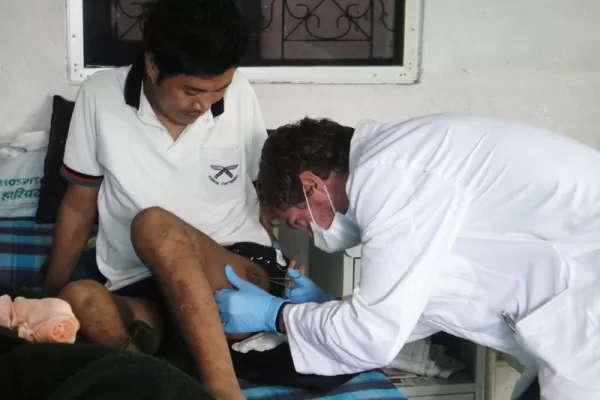
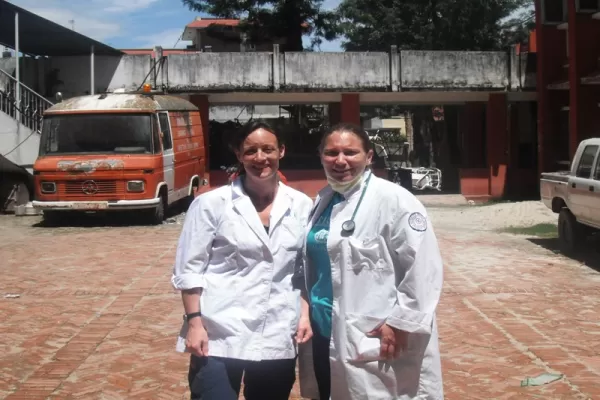
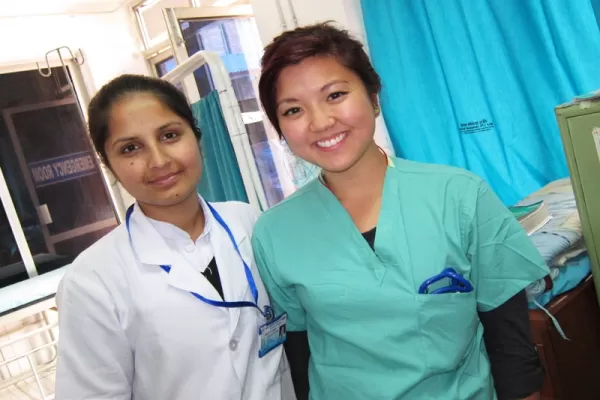
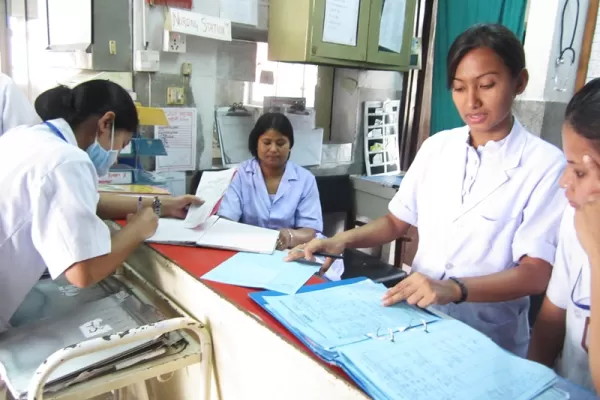
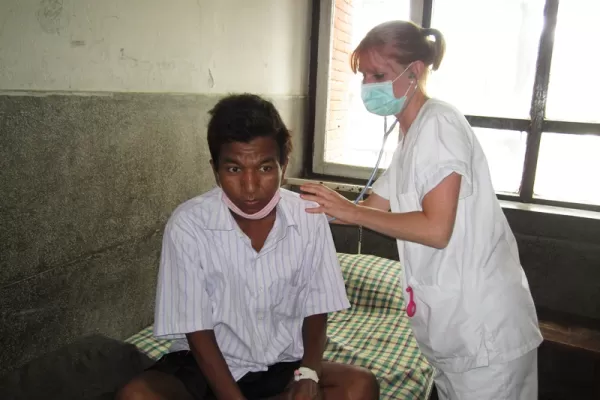
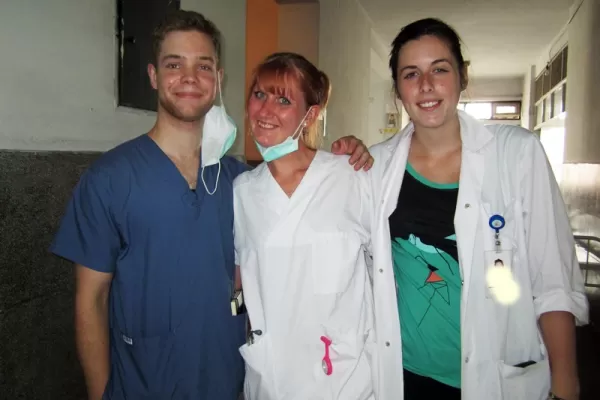
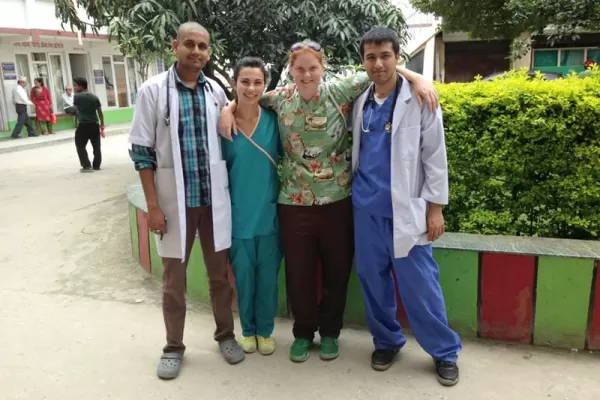
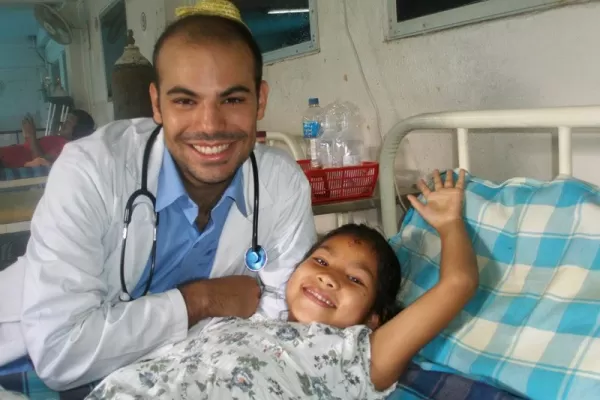
Living
Living
Airport Transfer
Volunteers and interns are picked up from the Tribhuvan International Airport in Kathmandu by a member of the local coordinating staff. Those volunteers who will be already in Nepal will be met by the staff at a designated meeting point decided beforehand.
Accommodation
The volunteer/intern house in Nepal provides a comfortable and welcoming environment for participants during their stay. It is located in Bafal, a peaceful residential area just a 10-minute drive from Thamel, the lively heart of Kathmandu known for its tourist attractions, shops, and restaurants. This location offers the perfect balance of tranquility and accessibility.
Volunteers can enjoy homemade meals, giving them a taste of traditional Nepali cuisine while ensuring their dietary needs are met. The house is equipped with high-speed Wi-Fi, allowing for seamless connectivity with family and friends or managing any personal or professional commitments. A television is also available for relaxation and entertainment during free time.
The accommodation includes all basic amenities needed for a comfortable stay, such as running water, hot water during winters, clean western style toilets and electricity. The living spaces are cozy and inviting, providing a great opportunity for volunteers to unwind and build connections with fellow participants. The house is managed by a dedicated coordinator based in Nepal, ensuring that all aspects of the accommodation are well-maintained and that volunteers have support for any queries or concerns.
This setup allows volunteers to focus on their projects and enjoy their experience while feeling at home in a supportive and well-facilitated environment. Private room requests can be accommodated at a nearby guest house for an extra charge.
Orientation
Your local program coordinator will provide an orientation and briefing upon your arrival. Depending on your arrival time, the orientation may be conducted on the same day or the following day. Typically, it lasts about half a day and covers essential topics such as local culture, greetings, key locations, transportation options, and other important details to help you settle in and navigate the area with confidence.
Meals
Two Nepalese meals (Breakfast and Dinner) will be provided to all volunteers depending on your work schedule. Breakfast typically consists of Bread, Butter, Jam, Sandwich, Tea etc. Typical meals provided include Dal (Lentils), Rice, Vegetables, Chicken and meat etc. The staple meal for most Nepalese people is dal bhat, which consists of lentil soup (dal), rice (bhat) and vegetables in curry (tarkari). If you have any special dietary requirements, you can let us know in advance and we can try our best to accommodate that.
During your Free Time
On weekends, participants in Kathmandu often take advantage of the city's prime location to explore Nepal's stunning natural beauty and cultural richness. Many choose to visit Chitwan National Park, renowned for its thrilling safari experiences and wildlife, including rhinos, elephants, and tigers. Another popular weekend getaway is the picturesque town of Pokhara, known for its serene lakes, breathtaking Himalayan views, and opportunities for adventure sports like paragliding and trekking.
During weekday evenings, when free time is limited, volunteers frequently spend time in Thamel, a vibrant and bustling area famous among backpackers. Thamel offers a variety of cafés, restaurants, shops, and cultural experiences. Volunteers can also explore Kathmandu’s rich history by visiting iconic landmarks such as the Swayambhunath Stupa (Monkey Temple), Durbar Square, or the Garden of Dreams, immersing themselves in the city's unique heritage and atmosphere.





Dates
Dates
November
17
December
01
15
January
05
19
February
02
16
March
02
16
April
06
20
May
04
18
June
01
15
July
06
20
August
03
17
September
07
21
October
05
19
November
02
16
December
07
21
Available
Filling Fast
Booked Out
Costs
| Duration |
Program Fee
|
Choose your currency
|
|---|---|---|
| 2 Weeks | $535 | |
| 3 Weeks | $700 | |
| 4 Weeks | $900 | |
| 5 Weeks | $1100 | |
| 6 Weeks | $1295 | |
| 7 Weeks | $1500 | |
| 8 Weeks | $1650 | |
| Extra Week | $200 |
Please Note: An application fee of is charged over and above the program fee as an application payment.
What are you Paying For?
- 24 hrs Assistance and support from staff
- Comprehensive Pre- Departure Information
- Pick up from the airport
- Orientation
- Food (2 times a day)
- Accommodation
- Travel & Medical Insurance (Available at an extra cost)
- Certificate of Participation(On Request)
What's NOT Included?
- Airfare
- Return Trip to Airport (Can be arranged at extra cost)
- Local Transportation
- Visa Fees
- Vaccinations
FAQ's
Connect with Past Volunteers
-
How can I connect with past Volunteering Solutions Nepal alumni as well as other former and current volunteers?
-
We encourage volunteers to get in touch with former Volunteering Solutions participants and also other program participants joining our projects. You are recommended to join thehttps://www.facebook.com/VolunteeringSolutions/">; Volunteering Solutions Facebook Page or Facebook">https://www.facebook.com/groups/volunteeringsolutions/">Facebook Group to connect with other participants and our team.
You can also visit the Nepal Program Reviews page to view the testimonials and feedbacks of our past participants.
To read alumni interviews and experiences, visit the ‘Meet">https://www.volunteeringsolutions.com/meet-a-volunteer">Meet a Volunteer’ section on our website.
Application and Program Details
-
Can I volunteer as part of a group?
-
Yes, you are welcome to take part in any of the volunteering projects in Nepal as a group. It is a popular destination for group participation. Our Nepal programs have hosted large student groups from around the world including that of schoolies coming for short term volunteering programs. Also, we can design special group programs for groups of 5 or more. Our programs are designed to be safe, affordable and offer a great group volunteering experience to the volunteers.
In our experience of more than 12+ years we have enabled and facilitated volunteer program placements for college groups, university groups, high school groups, group of families, group of couples as well as groups of colleagues. -
Does VolSol provides discount if I choose more than one program or if I am a returning volunteer?
-
If you are planning to come for multiple programs in your trip, you will have to pay the application fees just once. Your application fee is valid for a year's time (from the date of application). You will not have to pay the application fees again if you come within the mentioned time frame.
For our returning volunteers, $50 discount is provided for the application fee for their next VolSol program. -
When should I apply for the volunteer programs in Nepal?
-
VolSol recommends all its volunteers to apply for the desired programs well in advance. Our major booking seasons are from January to July and September to December.
As we have limited spots available in our programs and serve on first come first basis, it is strongly recommended to apply for the program and book your spots well in advance. You can book your spot in the program by filling an online form and paying the application fee.
Once you complete your application, your individual 'My Account' will be active in which you will receive your placement confirmation after which you can pay the program fees. You can pay the program fees later as well in installments, but 45 days before the program starts. -
What are the Program Locations in Nepal?
-
In Nepal, all our volunteering programs as well the accommodations are based in and around the capital city, Kathmandu.
-
How long will it take to process my application? Will my application be accepted ?
-
Usually, it takes around 10-12 working days for your application to be processed and placement to be confirmed by our team. After your application is accepted, your placement document will be updated in your ‘My Account’ online and you can view the information in your account. The application acceptance depends on the availability of seats in the project as well as the eligibility criteria of the program (age, skills and experience etc).
-
When do I need to arrive in Nepal for my program? What will happen once I arrive in Nepal?
-
All volunteers need to arrive in Kathmandu on the mentioned program starting date.
All volunteers are provided with the airport pick up from the Tribhuvan International Airport (Airport Code: KTM) by the local coordinator or representative. Those who are arriving overland or are already in Nepal will be picked up at? a meeting point decided beforehand. -
What will be my usual working hours?
-
Volunteers usually work for 5 to 6 hours a day, however. It can vary depending on their program. You will have the weekend off so you can go and travel on weekends. However, in some placements, you will need to work on some Saturdays as well.
-
Are there any necessary requirements to participate in the Nepal volunteer programs?
-
The minimum age requirement for the programs in Nepal is 17 years. For the Medical program, volunteers must be 18-year-old and above.
He/she should have the flexibility to adjust in new environment and culture.
For Medical Program – Pre-Medical, Medical and Nursing students as well as Medical Professionals are welcome to join. Participants with other qualifications in the medical field such as CAN, EMT can also join the program.
Participants must be in good health.
Volunteers who are 16-year-old are also accepted in the Childcare program in Nepal. However, they need to provide a notarized parental consent form. -
Does VolSol provides with a reference or a certificate after program completion?
-
Yes, we will provide you with the Certificate after successful completion of your program. The certificate is provided on request.
Health and Safety
-
What immunizations/vaccinations will I need?
-
Carry general medicines with you, other than that consult your doctor before flying. We recommend these basic vaccinations for your safety:
Tetanus
Hepatitis A and B
Typhoid
You are also requested to consult your doctor before traveling to Nepal to get a list of recommended vaccinations.
Also, if you have altitude sickness then ask your doctor to prescribe proper medicines. -
Do I need to buy a health insurance?
-
Yes, for all participants it is mandatory to have a travel medical insurance. To provide the best option to our participants, we offer insurance coverage in collaboration with a leading insurance provider at a very nominal cost.
-
How safe is Nepal and Kathmandu in particular?
-
This fabled land of Buddha attracts thousands of travelers from around the world. The country has easily embraced the western culture and is one of the most traveled destinations in the world. Women, especially, can feel relaxed in this country. It is safe to go out in the night; however, avoid the company of strangers. Volunteers are advised to follow the safety guidelines given in the pre-departure handbook as well as told to you by your coordinator during orientation.
Accommodation and Living
-
Would I have free time during my program? Can I do sightseeing during my program?
-
Typically, volunteers are required to put 5-6 hours every day, 5 days a week. However, work timing is dependent on the project chosen by the volunteers and can vary. You will get free time in the evenings and on the weekends. You can utilize this time to explore the local market streets of Thamel, visit Durbar Square, see evening prayers at the “ghat” of the Pashupatinath Temple and also visit Swayambhu temple. During the weekend, you can visit Chitwan National Park or go visit the famous tourist destination Pokhara.
We encourage our volunteers to travel. We have designed various weekend tours which can be booked under the ‘Add-on Tours’ section in your ‘My Account’. Your in-country coordinator will also help you book and organize the tours once you are in the country. -
What should I pack for my trip to Nepal?
-
We always suggest our volunteers to pack light. Being a country on the lap of the Himalayas, the temperature is usually on the colder side, and we would recommend you to get woolen wears and jackets. Pack comfortable clothes and walk shoes. Nepal is a conservative country with numerous sacred worshipping places where short, tight and revealing clothes wouldn't be allowed.
-
How do I get to the accommodation and the program location?
-
Your in-country coordinator will take you to your placement location from the airport and introduce you to everyone after giving you a basic orientation about the program, city, culture etc. You will be told about the daily mode of transport that you will need to take to go to your project location. Usually, the projects are within short distance from your accommodations. Some projects are within walking distance while others are a short ride away.
-
Are there more expenses once I arrive in Nepal?
-
Nepal is an inexpensive country. It is recommended to get your personal stuff from a proper general store that sells on MRP (Maximum Retail Price). Locals can often quote high prices for souvenirs, try to bargain and you will get a good price. A simple bracelet should not cost you more than 50-100 NC (Nepalese Currency). Food and dining in Nepal are very reasonable. A 10% (flexible) service charge is applicable in dining and lounging areas.
-
Can I know more about accommodation and food arrangements?
-
Accommodation is shared on the same gender basis in the home stay/host family which is managed by the VS Nepal in-country coordinator. The accommodations are neat and provide a comfortable stay during your volunteering period in Nepal. The accommodations have running water, electricity and all basic amenities available. Volunteers need to understand that living conditions in Nepal can be different as compared to what you have back at home. You need to be flexible, open minded and adapt to the culture and environment. Living with other like-minded volunteers from around the world is a great experience in itself. Two meals a day are provided to the participants (Breakfast and Dinner).
-
Can vegetarians be accommodated?
-
Yes – please do ensure that you inform the local team about your food preference and they can guide you so that you get to taste the best food available out there! Also, please do mention your specific food preference in the application form as well.
-
Where can I change my money in Nepal? Are there ATMs in Nepal?
-
There are many money exchange shops in Kathmandu city. The best option is to change your money at the airport counters itself. There are ATMs located all around the capital city, Kathmandu as well.
Flights and Visa
-
Tell me more about Visa for Nepal
-
Getting a Visa for this little Himalayan nation isn’t difficult in any way. You can get your visa on arrival at Kathmandu Airport itself or alternatively, you can also apply for Nepal Visa at your nearest Nepal Embassy.
-
What are the recommended inexpensive airline options to reach Nepal?
-
Tribhuvan International Airport (KTM) is the major international airport serving all flights arriving in Nepal. It is well connected with direct flights from major Asian and Middle Eastern countries. If you are arriving from North America or Europe, you will probably need to book a flight with a stopover at a Middle Eastern city such as Abu Dhabi or Doha.
The major airlines flying into Kathmandu are:Qatar Airways
Etihad Airlines
Air Arabia
Air India
Air Vistara
Silk Air
Dragon Air
Thai Airways
Fly Dubai
AlJazeera



























